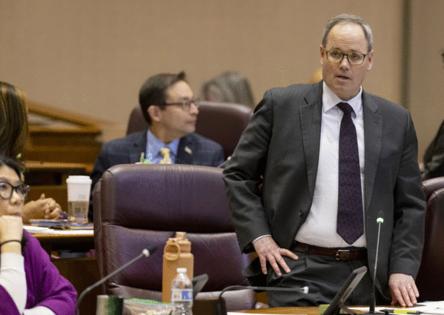Push to weaken Chicago Mayor Brandon Johnson's power to issue debt narrowly fails
Published in News & Features
CHICAGO — A City Council push to wrest power away from Mayor Brandon Johnson and his successors by requiring more aldermanic support to issue debt narrowly failed to advance Monday.
The City Council’s Finance Committee voted 17-to-16 to reject an ordinance that would have raised the vote threshold from a simple majority to a two-thirds majority. The measure would have sharply weakened the control of Johnson and future mayors over debt issuances, making it harder to raise money for infrastructure spending.
Before the vote, sponsor Ald. Marty Quinn, 13th, said the higher bar would force Johnson to work more closely with aldermen to pass bond plans and help Chicago avoid future credit downgrades.
“We cannot let this administration take on more debt and strap future Chicagoans with the bill,” Quinn said. “It’s time to be a more co-equal branch, partner and voice in City Hall. If not, what are we doing here?”
But while Johnson critics praised the move as fiscally responsible, mayoral allies blasted it as a reckless effort to block the City Council majority’s will.
“Essentially what this rule would do is empower a small group of people to hold everybody else hostage,” Budget Committee Chair Ald. Jason Ervin, 28th, said. “This is not designed to help us. It is designed to empower a very small group of people who seem to be hellbent on driving us over a cliff.”
Quinn introduced the measure in February as aldermen passed Johnson’s $830 million bond plan in a close 26-to-23 vote. At the time, the Southwest Side alderman and other mayoral opponents blasted the plan’s repayment structure as back-loaded and irresponsible. Fitch Ratings shifted the city’s financial outlook to “negative” in May.
Ald. Matt O’Shea, 19th, argued before the vote Monday the measure could help rebuild confidence in a government that he said many Chicagoans do not trust.
“The people of Chicago don’t trust government,” O’Shea said. “What I’ve witnessed here these last two years, with our government — I’m talking about this building, this room — they’re not wrong.”
The Johnson administration has often lied to him in budget discussions, he added.
“There is not enough real, honest communication,” he said. “If we communicate with each other, and enough information is provided to us, then we can make difficult decisions.”
Earlier in the meeting, the committee advanced a $400,000 settlement to pay a woman injured after falling on a broken sidewalk. Aldermen also advanced $35.2 million in settlements related to wrong-location police raids, police misconduct and a botched police chase.
Ald. Daniel La Spata, 1st, alluded to that broken sidewalk to push back against the debt ordinance. It is “disingenuous” to say the city’s infrastructure must be improved while making it more difficult for improvements to be made.
“I appreciate the desire for transparency… but there’s a political reality that I recognize,” he said, referring to the committed bloc of aldermen who oppose most Johnson moves.
Ald. Nicole Lee, 11th, said she could not remember when aldermen last hit 34 votes on a meaningful piece of legislation.
“I’m just really not sure we’re going to be able to get to two-thirds,” Lee said before voting against the measure.
While Johnson weathered the effort to take power away from him, the tight vote embodied many of the struggles he has had in winning over aldermen and controlling legislation, and not just because of what the ordinance sought to do. Johnson’s appointed mayor pro tempore, Ald. Sam Nugent, 39th, used her position’s powers to cast a vote against Johnson’s position, even though she is not a committee member.
Before Ald. Timmy Knudsen, 43rd, voted for the ordinance, he suggested he would have preferred a compromise. Knudsen had months ago proposed new guardrails on bond authorization to limit interest totals and back-loaded repayment schedules.
But Johnson’s administration would not agree to the policy he argued would have been a more moderate compromise, he said.
“Through months of good faith and transparent negotiation, I felt really confident that we were going to get somewhere,” he said. “Two-thirds at least will get us the kind of negotiation leverage we need.”
Aldermen did not consider whether or not they would replace the state’s expiring 1% grocery tax with a 1% tax of their own. The lack of consideration on the thorny question sets up more discussion in September, when the City Council would need to quickly pass the tax if it plans to make the state’s Oct. 1 deadline to do so.
____
©2025 Chicago Tribune. Visit at chicagotribune.com. Distributed by Tribune Content Agency, LLC.







Comments